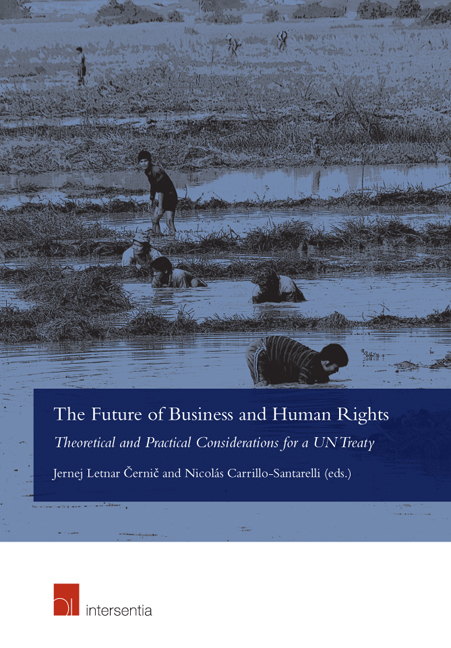Book contents
- Frontmatter
- Dedication
- Acknowledgements
- Contents
- About the Contributors
- Introduction
- Part I The Convenience and Possibility of Adopting a Treaty on Business and Human Rights
- Part II Critical Analyses Of A Treaty On Business And Human Rights
- Part III Regional Approaches
- Business and Human Rights in the Americas: Defining a Latin American Route to Corporate Responsibility
- The Applicability of Human Rights Treaties to Business Enterprises: A Case Study of India
- Reckless Business: Corporate Accountability for Atrocities
- European Perspectives on the Business and Human Rights Treaty Initiative
- PART IV Lessons from other Regimes of International Law
- Conclusion
- Index
Reckless Business: Corporate Accountability for Atrocities
from Part III - Regional Approaches
Published online by Cambridge University Press: 11 October 2018
- Frontmatter
- Dedication
- Acknowledgements
- Contents
- About the Contributors
- Introduction
- Part I The Convenience and Possibility of Adopting a Treaty on Business and Human Rights
- Part II Critical Analyses Of A Treaty On Business And Human Rights
- Part III Regional Approaches
- Business and Human Rights in the Americas: Defining a Latin American Route to Corporate Responsibility
- The Applicability of Human Rights Treaties to Business Enterprises: A Case Study of India
- Reckless Business: Corporate Accountability for Atrocities
- European Perspectives on the Business and Human Rights Treaty Initiative
- PART IV Lessons from other Regimes of International Law
- Conclusion
- Index
Summary
INTRODUCTION
As a result of globalisation, corporations that operate across national borders have gained unprecedented power and influence across the world. As noted in the case of Nigeria: Social and Economic Rights Action Centre (SERAC) and Another v. Nigeria, companies operating across borders are often involved in severe abuses, such as forced labour or forcibly relocating communities from their lands. Addo has aptly noted that ‘[a]mid rapid economic growth and new investments in land and natural resources, there is an increasing awareness of why human rights must be brought into business strategies and operations’. Amnesty International has exposed countless instances where corporations exploit weak and poorly enforced domestic regulation with devastating effects on people and communities. Abuses are particularly stark in the extractive industry, with companies competing against each other to mine precious resources. Traditional livelihoods are destroyed as land is contaminated and water supplies polluted.
In its publication, Injustice Incorporated, Amnesty International has revealed four cases of the effects of corporate action on human rights, namely: Trafigura (2006) concerning the dumping of toxic waste in Abidjan, Côte d'Ivoire (in violation of Dutch and European Union law); Bhopal (1984) involving a gas leak and continuing environmental contamination; Omai (1995) relating to the failure of the waste containment system at the Omai gold mine in Guyana; and Ok Tedi (1984) exposing the failure of the waste containment system at the Ok Tedi gold and copper mine in Papua New Guinea and continuing environmental contamination. Using their financial muscle, companies have used legal fictions and political power to evade meaningful accountability and deny victims their right to remedy. In this regard, Professor John Ruggie has aptly summarised that:
The question that confronted the international community is how, in a world of profit maximizing firms and states jealously guarding their sovereign prerogatives, can multinational corporate conduct be regulated to prevent or mitigate such human costs? The core challenge is that globally operating firms are not regulated globally. Instead, each of their component entities is subject to the individual jurisdiction in which it operates. Yet even where national laws exist prohibiting abusive conduct, which cannot always be taken for granted, states in many cases fail to implement them – because they lack the capacity, fear the competitive consequences of doing so, or because their leaders subordinate the public good for private gain.
- Type
- Chapter
- Information
- The Future of Business and Human RightsTheoretical and Practical Considerations for a UN Treaty, pp. 209 - 228Publisher: IntersentiaPrint publication year: 2018

